Fotos - Salvapantalla
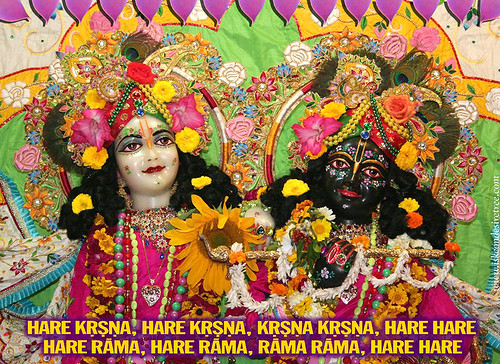
Krsna_Balaram_Mahamantra_ScreenSaver_05_W
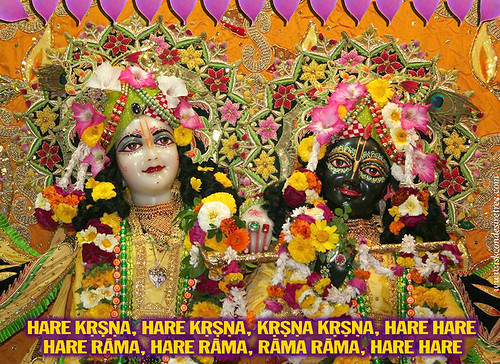
Krsna_Balaram_Mahamantra_ScreenSaver_06_W
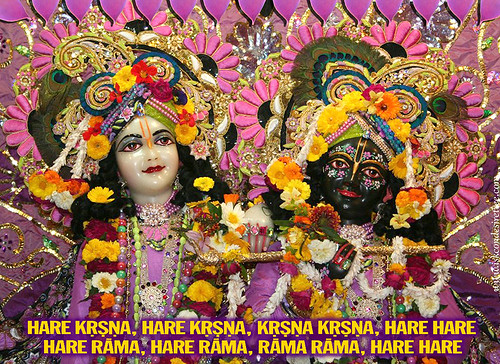
Krsna_Balaram_Mahamantra_ScreenSaver_07_W
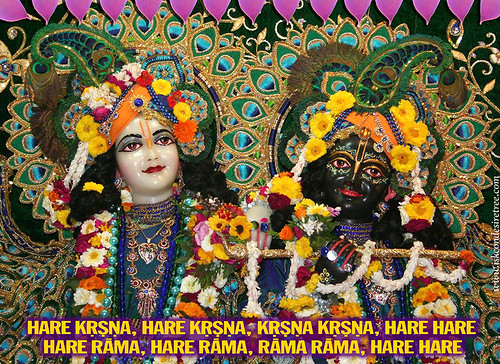
Krsna_Balaram_Mahamantra_ScreenSaver_08_W
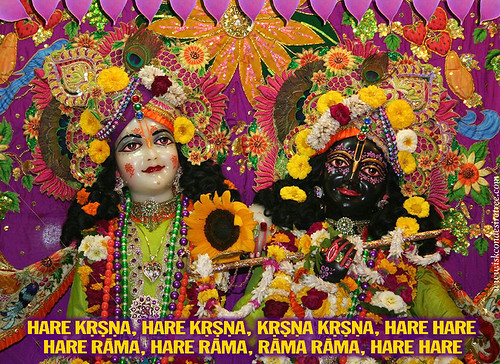
Krsna_Balaram_Mahamantra_ScreenSaver_09_W
Sixteenth Sarga
sarvva-shakti-prakashah
Lord Gaura Reveals All Potencies
kirttana kuru harer iti vadi / bodhayas tri-jagati paritaptam 1
pravishat - he entered; tat anu - after that; danda-dharah - holding a staff; agratah - before; purna-candra-sadshah - like the full moon; hari-dasah - the exemplary teacher of the holy names; kirtanam - chanting; kuru - please make; hareh - of Hari; iti - thus; vadi - speaking; bodhayan - enlightening; tri-jagatim - the three worlds; paritaptam - suffering much.
(The drama performance continued:)
Haridasa, then appeared like the full moon before the assembly of the Lord and His bhaktas. Bearing a staff, he addressed them as follows, Perform Shri Hari-kirtana and thus enlighten the living beings of the three worlds, who are now burning in the fire of sense enjoyment.
vainava nantur udgata-netra- / varibhis timita-vigraha-bhajah 2
tasya - his; tat-vacanam - his words; abja-mukhasya - of the lotus-faced; sannipiya - drinking intensely; hita - thrilled; anga-ruhah - hairs; te - they; vainavah - the devotees of Vishnu; nantuh - they (sang) and danced; udgata - coming forcefully out; netra - eyes; varibhih - by the waters; timita - wet; vigraha - body; bhajah - experiencing.
After drinking through their thirsty ears the words of Haridasa, whose face resembled a blossoming lotus, the vaishnavas began to sing and dance, their hairs thrilled with rapture, and their bodies became wet from tears which spurted forcefully from their eyes.
akipann iva sudha iva kantim / abja-caru-vadanah sa mahatma 3
pravishat - he entered; tat anu - afterwards; vainava-raja - the king of vaishnavas; rajamanah - shining; iva - like; tigma-maricih - the sun; akipan - casting; iva - like; sudham - nectar; iva - like; kantim - luster; abja - lotus; caru - beauty; vadanah - face; sah - he; maha-atma - great soul.
Then the great soul and king of the vaishnavasAdvaita _carya entered . He shone with fierce brilliance like the sun, His attractive lotus face radiating nectar and splendor.
ananarta hari-pada-rasardro / matta-siha iva durddamanantah 4
ishvarasya - of the Supreme Lord; kalaya - by a plenary portion; tu - indeed; vijata - originated; advaita-varya - the avatara of a devotee; itarai - by the subordinate; anugaih - by the followers; sah - he; ananarta - He danced towards; hari-pada - the feet of Hari; rasa - mellows; ardra - tender; matta-siha - maddened lion; iva - like; durdamana - indomitable; antah - death.
He is a plenary portion of the Supreme Personality of Godhead, and His heart is soft because of absorption in the flavors of Shri Hari's feet. Together with His servants and disciples, He danced towards them like a maddened lion or indomitable death.
adbhuta papur avashya hdas te / prema-sagara-raseu nimagnah 5
tam - Him; vilokya - glancing; muditaih - with glad; nayana-abjaih - with lotus eyes; sadhavah - the saints; sadasi - in the assembly; tasya - his; mukha-indum - moon-like face; adbhutam - wonderful; papu - they drank; avashya - spontaneously; hda - hearts; te - they; prema-sagara - ocean of love; raseu - in the mellows; nimagnah - immersed.
The saints of that assembly gladly gazed upon Him, and drinking deeply of His marvellous moon-like face with its lotus-petal eyes, their hearts became spontaneously immersed in the manifold mellows of the prema-sagara.
prana-natha-kara-pallava-pradhto / nayana-vari-paripurna-su-dehah 6
gopi-vesha-dharaka - wearing the attire of an elderly milkmaid; baladevah - the mighty Lord; pravishat - entered; rasa-vishea - specific mellow; vinodi - enjoyer; prana-natha - Lord of the life; kara-pallava - petal-like fingers; pradhta - clasped; nayana-vari - tears; paripurna - overbrimming; su-dehah - excellent body.
Nityananda Baladeva, who takes especial delight in rasa, then entered the stage, attired as an elderly gopi. In His hand He held the petal-like fingers of the Lord of His life, and His beautiful body was fully flooded by tears.
tapta-kancana-vapuh kanakadri- / shnga-raja iva jangama-veshah 7
vasudeva - the son of Vasudeva; kta - made; vesha - attire; visheah - specific; pravishat - entered; sa - He; bhagavan - the all-opulent Lord; amta-ashuh - He whose rays are like nectar; tapta-kancana-vapuh - a body colored like molten gold; kanaka-adri - golden mountain; shnga-raja - the king of mountains; iva - like; jangama-veshah - in the dress of a traveller.
Then entered Bhagavan Chaitanya Vasudeva. With his body complexion like molten gold and his effulgence like the nectar-radiating moon, it appeared as if Meru, the king of mountains, was somehow walking. He was suitably attired for His special mission of teaching the ecstasy of gopi-rasa.
nupurena nuta-pada-su-padmah / sukma-madhya-vapua sa nanarta 8
gopika - a milkmaid; iva - like; vara-kanculi - beautiful bodice; vakah - chest; shankha - conch; kankana - bracelets; dhara - wearing; aruna-vastrah - saffron garment; nupurena - with anklebells; nuta - praised; pada-su-padmah - sweet lotus feet; sukma - slender; madhya - middle; vapua - with His body; sa - He; nanarta - danced.
Like a gopi He wore a beautiful bodice on His chest, bracelets made of tiny conchells, and a saffron dress around His very slender waist. He danced with sweet lotus feet celebrated by tinkling anklebells.
divya-gandha-pavanah sa kampayan / malati malayajo vavau muhuh 9
jyotia - by the light; atimilite - covered; bhuva tale - on the planet earth; deha-jena - from the body; n-hareh - of Hari in human form; kte - done; tada - then; divya-gandha-pavanah - the divinely perfumed breeze; sa - He; kampayan - caused to shake; malatim - jasmine; malaya-ja - born in the Malaya Hill; vavau - blew; muhuh - repeatedly.
The earth became immersed in the luster from Nrihari's body,
and a divinely perfumed breeze blew from the Malaya Hill again and again, causing the malati flowers to tremble.
candrama divi suresha-mahesha- / loka-pala-sa-ganavta-marge 10
kheda - depression; shoka - grief; kalaya - by parts of; avidita - unknown; api - although; purna-mandala - the complete moon; iva - like; pracakashe - He revealed; candrama - by the moon; divi - in the heavens; sura-isha - Indra; maha-isha - Shiva; loka-pala - deities of the planets; sa-gana - with their hosts; avta - overcast; marge - on the path.
As the full moon shines to illuminate the paths of the heavens for Indra, Shiva and the various planetary deities, the moon of Gaura shone and dispelled any trace of depression or grief.
bhavam ashu vidadhe kamalayah / kanti-bhava-bhd vapuo 'syah 11
kirtanam - chanting; sa - He; bhagavan - the illustrious Lord; ati-teja - having great potency; nartanam - dancing; ca - and; muditah - joyous; pracakara - performed; bhavam - ecstasy; ashu - suddenly; vidadhe - enacted; kamalayah - of the goddess of fortune; kanti - beauty; bhava - ecstasy; bht - bearing; vapua - of the beautiful body; asyah - of Her.
The Lord began to blissfully sing and dance with much energy. Then, replete with ecstasy and loveliness, He played the part of the goddess of fortune.
sannikaram upastya vinito / navya-vastra-dashaya kusumani 12
vigrahad apanayan punar eva / tatra tani nidadhe su-manasi
prema-bhakti-rasa-purita-koti- / mat-sneha-paripurito 'bhavat 13
tatra - there; deva-gha-madhya - in the midst of the temple; gatayah - of her who had gone; kna; divya-vapuah - the divine form; pratimayah - of the Deity; sannikaram - drawing close; upastya - approaching; vinita - humbly; navya - new; vastra - a cloth; dashaya - with the hem; kusumani - flowers; vigrahat - from the sacred form; apanayan - taking back; puna - again; eva - alone; tatra - there; tani - them; nidadhe - she accepted; su-manasi - jasmine; prema-bhakti - devotional love; rasa-purita - filled with mellows; koti - millions; mat - mothers; sneha - affection; paripurita - completely full; abhavat - it became.
The goddess humbly approached the Deity form of Kna in the middle of the temple. She took some jasmine flowers from the Deity with the hem of her new sari, and as she offered them again to Him, Her heart became filled to overflowing with prema-bhakti-rasa, like the affection of ten million mothers.
ajnaya sakala-deva-mayasya / tasya hta-manaso dvija-mukhyah 14
tam - that; striyam - woman; pramuditah - very jubilant; parinemuh - they bowed down very low; sastavena - with a hymn; shrutibhih - from the shruti shastras (Vedas); pratutuvuh - they praised; ajnaya - by the order; sakala-deva-mayasya - who is the sum total of all gods; tasya - His; hta-manasa - exultant hearts; dvija-mukhyah - eminent brahmanas.
Then, by the order of the Lord, who is the sum total of all the gods, the eminent brahmanas very jubilantly offered their homage to that lady. They praised her with exultant hearts, singing a hymn from the Vedas.
bhavam eva su-jana mudam apus / tutuvuh sura-ktaih stava-rajaih 15
tat-kanat - at that moment; puna - later; abhut - it was; bhagavatyah - of the goddess Durga; sarva-shakti-mayatam - the quality of having all potencies; tu - indeed; vahatyah - who conveyed; bhavam - ecstasy; eva - indeed; su-jana - the good people; mudam - happiness; apu - they attained; tutuvuh - they praised; sura-ktaih - composed by the saints; stava-rajaih - with exalted hymns.
A moment later, the Lord entered into the all-powerful mood of goddess Durga. The people became enlivened and offered praises by chanting excellent hymns composed by the saints.
pravishan natana-vikana-kama / 'tragatasmi bhavata kutukena 16
asane - on a seat; samupavishya - sitting down; su-klipte - nicely carved; devata-pratikti - Personality of Godhead; puna - again; aha - He said; pravishan - entered; natana-vikana-kama - desiring to see a dance; atra - here; agata - come; asmi - I have; bhavatam - of your honors; kutukena - because of eagerness.
Then seating Himself on a fine asana, the Personality of Godhead in the form of the goddess again spoke, "I have come here eager to see a dance performed by your good selves."
abravic ca mayi te yadi bhaktir / jayate yadi vadiyati lokah 17
canda ea iti su-smita-vaktra / tan uvaca tarhi te bhuvi nemuh
brahmanas tam anu sa hari-dasam / arka indu-sadsha samagrahit 18
dehi - You must give; devi - O goddess; tava - your; pada-yuga-abje - at your two feet; prema-bhaktim - devotional love; iti - thus; te - your; puna - again; ucuh - they said; abravit - He said; ca - and; mayi - unto you; te - your; yadi - if; bhakti - devotion; jayate - it is born; yadi - if; vadiyati - it will say; lokah - the world; canda - follower of Cani (Durga); ea - this; iti - thus; su-smita-vaktra - brightly smiling face; tan - to them; uvaca - He said; tarhi - then; te - they; bhuvi - on the earth; nemuh - they bowed down; brahmana - those conversant with spirit; tam - Him; anu - after; sa - she; hari-dasam; arka - sun; indu-sadsham - like the moon; samagrahit - embraced.
The devotees again prayed, "O goddess, just bestow on us loving devotion to Your lotus feet." With a laughing face, Mahaprabhu replied, "If love should awaken in your hearts for Me, then all the people will say of you, `These are devotees of goddess Cani.'" Then the brahmanas bowed down on the earth before Him as the sun of Gaura embraced the moon of Haridasa.
tatra ko 'pi samuvaca murari / dinam enam avalokaya devi 19
panca-hayena - five years old; iva - like; abhavat - he became; tada - then; sa api - that same person; tatra - there; tat - that; abhut - it was; ati-citram - very wonderful; tatra - then; ka api - anyone; samuvaca - addressed; murarim - the enemy of Mura; dinam - lowly; enam - him; avalokaya - please look; devi - O goddess.
Then a most amazing thing occurred. Haridasa became like a little boy of five years, and he addressed Caitnya Murari, "O goddess, kindly cast Your glance of mercy upon this lowly fellow."
tat-kanat samanubhuya ca sa tat- / pujana nija-janasya su-vesha 20
tat - that; nishamya - hearing; nayana-abja-yugena - by His two lotus eyes; prema-toyam - water of love; asjat - He released; karuna-ardra - tender with mercy; tat-kanat - at that moment; samanubhuya - perceiving; ca - and; sa - She; tat-pujanam - the worship of the Lord; nija-janasya - of His own man; su-vesha - in fine dress.
The moment He heard this, the Lord who was attired in the attractive dress of the goddess of fortune, His heart softened with compassion, considered all the devotional service which His dear devotee had performed, and tears of love fell from His lotus eyes.
ta vilokya karunardra-su-netram / ishvara nija-jana mudam apuh 21
stanyam - breast milk; ashu - quickly; vidadhe - bestowed; sura-varyan - to the godly men; payayan - made drink; asura-vahini-ripuh - the enemy of the demoniac armies; tam - Him; vilokya - glancing; karuna - mercy; ardra - tender; su-netram - fine eyes; ishvaram - the Supreme Lord; nija-jana - His personal associates; mudam - happiness; apuh - attained.
Then the Lord, who is known as the annihilator of the armies of the demons, gave breast milk to those most exalted of godly men. And as they gazed upon the Supreme Lord, whose beautiful eyes were filled with tender compassion, His associates felt joy.
nemur ardra-nayana jagad-isha / tutuvush ca mudita dvija-varyah 22
tat-kanat - at that moment; bhagavatah - of the Lord; puna - again; eva - indeed; bhava - ecstasy; ishitu - of the master; abhut - it became; avalokya - beholding; nemu - they bowed down; ardra-nayana - having moist eyes; jagat-isham - the controller of the material worlds; tutuvu - they praised; ca - and; mudita - enlivened; dvija-varyah - the eminent twice-born men. At that moment, Gaura's mood as the reservoir of all opulence and the Supreme Master arose once more. Perceiving this, those eminent twice-born men bowed down and offered praises with moistened eyes and enlivened hearts to the Lord of the cosmic manifestation.
eva ninaya bhagavan sakala nisha sa / pratar jagama nija-mandiram indu-vaktrah
hasta-ghita-vara-danda ivati-canda- / rashmeh shikheva n-harir dadshe janena 23evam - thus; ninaya - passing; bhagavan - the all-opulent Lord; sakalam - all; nisham - night; sa - He; prata - at dawn; jagama - He went; nija-mandiram - to His own home; indu-vaktrah - face like the moon; hasta-ghita - taking in the hand; vara-danda - a fine staff; iva - like; ati-canda - very fierce; rashmeh - having rays; shikha - flame; iva - like; n-hari - Shri Hari in His human-like form; dadshe - He was seen; janena - by the people. Thus He passed the whole night, and at dawn the Lord whose face was lustrous like the moon went to His home, holding a fine staff in His hand. The people saw Nrihari like a brilliant flame.
Thus ends the Sixteenth Sarga entitled "Lord Gaura Reveals All Potencies," in the Second Prakrama of the great poem Shri Chaitanya Carita.
BY: SUN STAFF
Jan 12, CANADA (SUN) — A serial presentation of Shri Krishna Chaitanya-carita Mahakavya, written by Shrila Murari Gupta (1513 A.D.). Translation into English by Bhaktivedanta Bhagavata Swami.
Sri Garga-Samhita | Oraciones Selectas al Señor Supremo | Devotees Vaishnavas | Dandavat pranams - All glories to Srila Prabhupada | Dandavat pranams | Santos Católicos | El Mundo del ANTIGUO EGIPTO II | El Antiguo Egipto I |Archivo Cervantes | Neale Donald Walsch | Sivananda Yoga | SWAMIS | Hari Katha | Hinduismo | Biografías


No hay comentarios:
Publicar un comentario